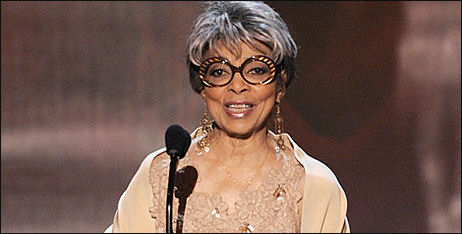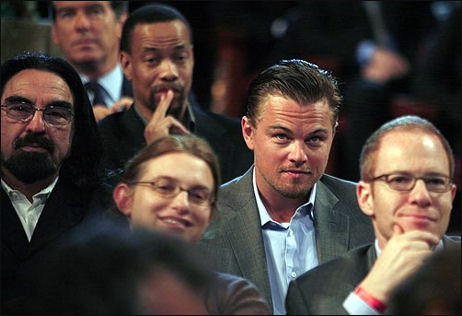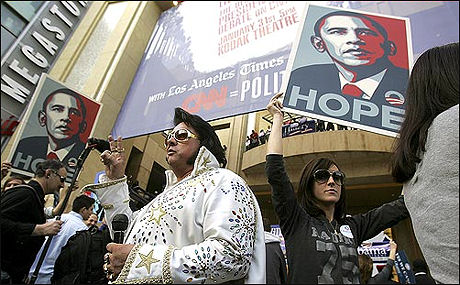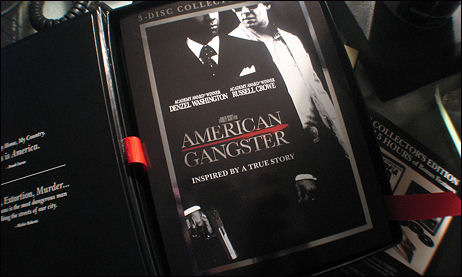Hell on Frisco Bay‘s Brian Darr, who’s seen three of the four Best Documentary Short nominees, believes on a basis of the synopsis that Freeheld, about “a dying cop trying to fight for benefits for her lesbian partner…sounds like it could be the most seductive to Oscar.” The other three nominees are Salim Baba, La Corona and Sari’s Mother.
L.A. Times writer Steve Pond has seen all four. He passed along mini-takes earlier this afternoon:
“Freeheld: New Jersey cop dying of cancer, local bigwigs deny her pension benefits to her lesbian
partner. Straightforward style, doesn’t stand out, but it has an uplifting ending and is the one nominee
set in the U.S., which could help.
“La Corona: A beauty pageant set inside a Columbian women’s prison. It’s a story you haven’t seen before, but it feels too light compared to the others. This is the only one I’d say doesn’t have much shot.
“Salim Baba: Delightful, fresh story about an old guy who pushes a ‘cinema cart’ through the streets of
India, showing ‘movies’ he’s assembled from scraps of discarded film. Shows the power of movies in the
unlikeliest of settings; after seeing them all, I picked it to win. Then I got home and read a wire story about how the guy says he was ripped off by the filmmakers…that could hurt if the story gets around.
“Sari’s Mother: Don’t mean to be dismissive of a horrible situation, but it hits a trifecta of Oscar-bait miseries: a mother in Iraq tries struggles get health care for her son with AIDS , and it’s well-made and very, very depressing, which sometimes is just what voters are looking for.”
Final HE comment: It’s hard to see these films. Why aren’t they just being put up for common viewing online? Wouldn’t that be the simplest solution?
Why Ruby Dee?
So where did that Ruby Dee SAG award for Best Supporting Actress come from? Four words: “sentiment” and “no DVD mailings.”

Apart from mass SAG mailings of Into The Wild DVDs, which benefitted the barely-in-the-race Catherine Keener, DVD screeners of the films starring the major nominees in this category — American Gangster‘s Dee, Gone Baby Gone‘s Amy Ryan, I’m Not There‘s Cate Blanchett and Michael Clayton‘s Tilda Swinton — were not, I’m told, sent to the SAG membership. In Pete Hammond‘s view, that levelled the playing field “and opened the door to the sentimental favorite.”
Yeah, but why? Dee’s performance, after all, is basically a one-scene, telling-off-her-gangster-son thing. It’s good but not superb. It’s certainly not in the realm of Beatrice Straight‘s Oscar-winning turn for her one big scene in Network. Dee gave a very strong performance for what it was, but she’s more or less ice-skated into the Oscar competition. She’s no match for Blanchett’s Jude or Ryan’s coked-out Dorchester mom. People realize that, I think.
Be Happy Now
Futuristically-speaking, No Country‘s Josh Brolin has told L.A. Times Magazine‘s Ginny Chien that he’ll always “be happy whether I’m doing dinner theater in Phoenix or some great movie with Michael Mann. I’ve always been, and I always will be. As much as I appreciate the moment, I know the moment will change.” And then change back again. There’s no “good” or “bad” side of the coin — there is only the momentous import of the coin’s particular constitution. Happy and sad, flush and poor, up and down are fool’s illusions.
Doesn’t Look Good
With the increasingly pessimistic strike mood, the WGA still determined to picket the Oscar show if the strike is unresolved on 2.24 and SAG members just as unwilling to cross picket lines as they were for the Golden Globes, the odds of a traditional bells-and-whistles Oscar telecast going forward are looking less and less favorable. It’s going to come down to some kind of half-baked fizzle show on 2.24 or Sid Ganis and Gil Cates delaying the broadcast until mid-April in hopes of the strike being over by then. But how likely is that?

Yesterday Variety‘s Dave McNary observed that “as the strike enters its 89th day today, there’s been no date set for the start of formal bargaining. That, combined with strike fatigue and SAG’s recent militancy, has darkened the town’s already gloomy mood. Some worry that after the June 30 expiration of its contract, SAG will join the writers in striking and that both guilds will stay out at least into the fall.
“Sources have said that recent informal meetings between guild leaders and the moguls have remained largely unproductive on the biggest compensation issues, trying the patience of the strike-weary town.” Face it, deal with it — things don’t look good.
Being At The Debate
I had never attended a presidential debate before, and so yesterday’s Barack-vs.-Hillary “conversation” (classy but too chummy and cordial to be called a dispute) felt special. I lined up in the main foyer to receive my entrance wristband around 1:30 pm. The thunderous “Oh-bah-MAH!” chanting outside the Kodak theatre sounded like a revolution on the palace steps. (A slightly unnerved female Clinton supporter I was standing next to said, “What’s that shouting?”) Tom Hayden was hanging around and joshing. Lots of amiable chatting and time-killing.

I was inside the theatre, which seems a bit smaller in actuality than it has on those Oscar telecasts, by 2:40 pm. I quickly found a pair of choice unmarked seats in the fourth row center section on the right-side aisle. (Right behind Rob Reiner, as it later turned out.)
No cell phones or PDAs were allowed, so the next couple of hours was basically taken up by newspapers, schmoozing and eyeballing. Steven Spielberg (seated next to wife Kate Capshaw and producers Kathleen Kennedy and Frank Marshall) was on the other side of the house, same fourth row. Garry Shandling, Pierce Brosnan, Amy Pascal, Amber Tamblyn, ICM chief Jeff Berg. Leonardo DiCaprio, his dad George and publicist Ken Sunshine slipped in at the last minute; so did Diane Keaton and Stevie Wonder.
I said hello to screenwriter and good hombre Larry Karaszewski (1408, The People vs. Larry Flynt, Ed Wood). Breitbart.com‘s Andrew Breitbart, Politico‘s Jeff Ressner, “Loot” author and Washington Post contributor Sharon Waxman, producer and Democratic consultant Lawrence O’Donnell, among others.
CNN host Wolf Blitzer came out a few minutes early to chat a bit and warm the audience up. “Any questions?” he said at one point. “Where’s Anderson?,” someone called out. “He was on last night,” Blitzer said. “What’s your favorite all-time movie?,” someone said. Blitzer responded, “Uhmm, favorite movie, let’s see…Ferris Bueller’s Day Off?”

Did the “debate” seem the same from the orchestra as it did to TV viewers? I know that I sensed early on that the atmosphere of niceness and deference was deflating the juice potential, but it was obviously intentional. As one guy observed, “Clinton is ahead in polling and she didn’t want to upset that, so she played it nice and safe. Obama is catching up fast and he didn’t want to upset that, so he played it nice and safe.”
The Iraq War discussion definitely went in Barack’s favor, but with his usual delicate allusions (he was very much the conciliator, uniter, peacemaker) it was left to Blitzer to strike the Hillary blows, of which there were at least two.
Clinton didn’t do very well in fending off the voting-for-Iraq questions. Obama’s statement that the real problem with Iraq was “the mindset that got us in the war in the first place” cut right to the quick.
We were watching carefully delivered performances, of course, but I still found myself slightly warming to Hillary, being already permanently warmed up to Barack and against my better judgment. She was sharp, poised and very attuned. I said to myself at one point, “She is the enemy of of the ’08 wave-dream that has carried Obama aloft and a very likely catalyst of a McCain victory in November, but she’s very sharp and shrewd. I’ll be miserable if she’s nominated, but I suppose I’ll have to hold my nose and vote for her. I prefer her to McCain.”

Hillary and Barack, suddenly three-dimensional and organically alive instead if the 2-D figures they’ve been all along, stood at the edge of the stage and shook hands and signed programs for about ten minutes after the cameras went dark. A lot of people pushed forward for this, but I just stood there mesmerized. What a sight, what a thing to see first-hand.
A Frank Luntz focus group on Fox felt overwhelmingly that Obama prevailed over Clinton, but the people I spoke to felt it was more of a draw. Shandling told me he felt a little noddy during the first half. Breitbart felt that Obama did fine, but that he “lost” in a sense because he didn’t decisively score against Clinton. I gave the slight edge to Obama, but basically felt they both came off well because of the classy-dignified thing. Nobody’s apple cart was pushed over.
The after-party around the Roosevelt hotel pool (waiters serving little juicy burgers, crab cakes and quesadillas, and lots of heaters going full-blast) was relaxing and not overly crowded. I’d noticed Stevie Wonder standing up and vigorously applauding when Blitzer talked about Obama and Clinton being the ultimate “dream ticket,” so I went over and asked him what kind of dream — Obama-Clinton or Clinton-Obama? The former, he answered, but you know Wonder’s songs and lyrics — he’s into anyone or anything coming together and feeling the love and blissing out.
Plouffe raps Clinton campaign critique
“I don’t think the [Clinton] campaign…generally ruled to be out of bounds in any number of areas, has a lot of authority on lecturing any else about the tone of a campaign.” — Obama campaign manager David Plouffe speaking earlier today.
Thursday tracking
The Eye is tracking at 72, 35 and 12 — on a normal weekend the Jessica Alba thriller would be looking at something like $15 million, but tempered by Sunday’s Super Bowl it may dip down to the $11 or $12 million range. Over Her Dead Body is at 65,25 and 4. Strange Wilderness…36, 25 and 2. For whatever reason the significant indicators that the Hannah Montana concert film will be extra-big (as indicated by yesterday’s Fandango report) aren’t showing up in tracking…79, 15 and 4..
Fool’s Gold, opening next week, is now at 81, 33 and 7….decent. Vince Vaughn’s Wild West Comedy Show…28, 11 and 0. Welcome Home Roscoe Jenkins…59, 29 and 5. Definitely Maybe (2.14) is now at 35,29 and 1. Jumper…52, 39 and 6….not bad. Vantage Point (2.22) is at 44, 38 and 4…it could pop.
A voice artist to loop Ledger?
How will Warner Bros. and the Dark Knight team handle Heath Ledger‘s unrecorded looping sessions? Slate‘s Kim Masters is reporting that “it would be unusual for director Chris Nolan to have all the sound that he wants at this early stage [for a film coming out in July], and that on a big-budget franchise picture like The Dark Knight, a producer opines, “looping would be the norm.”

The obvious solution would be to use a voice artist “and there are rumors that the studio will do that,” Masters writes. “If so, the studio’s denials would be understandable: Warner wouldn’t want the public to be listening for variations in the voice when the movie is released. But the producer assures: ‘With a good voice artist, you would never know the difference.'”
Perspective
“Feb. 5th isn’t going to decide anything for Obama or against, and tomorrow night isn’t the American Idol finale. Remember [that] the Democrats don’t play the ‘Winner Take All Game’ with delegates that the GOP does. I expect Obama to lose California, but lose close. At the end of the day though, he’s going to come away with a huge chunk of delegates from California. And Feb. 12th isn’t going to settle much either. In a way, look to April…Ohio, Pennslyania.
“Obama just got himself 170,000 new contributors after N.H. Those people aren’t going to be voting for Hillary. I’d bet that a majority of Edwards Supporters (particularly here in California) are going for Obama.
“Also, Florida was very interesting. 59% of the votes cast in Florida were done through early voting. Hillary creamed Obama among early voters. But among voters deciding late, among voters who decided at the polls the day of the primary, they split 50-50. (This is a concern in California as well as more and more people vote early).
“The bottom line is that Obama is in it to win it. This is no joke. The needle is moving in his direction.” — HE reader Malcolm Johnson.
Extended “Gangster” in the wings
The unrated extended edition DVD of American Gangster coming out on 2.19 will run 174 minutes vs. the 157-minute theatrical version. As I said in my original review, I could easily rolled with a three-hour theatrical cut.

February Dog Days
The usual February dog days aren’t as canine as they could be. Screenings of City of Men, The Eye, Young at Heart, Diary of the Dead, The Hottie and the Nottie, Cover, The Witnesses, Snow Angels. (What about Vantage Point?) In Bruges, The Band’s Visit and Fool’s Gold (HE favorite Matthew McConaughey!) opening on 2.8; Be Kind Rewind, The Counterfeiters and Vantage Point on 2.22; Chop Shop on 2.27 in NYC; Chicago 10 (limited); City of Men and The Other Boleyn Girl on 2.29. Plus the will-they-or-won’t-they-happen Oscars, special screenings, script reviews, next week’s DVD of The Assassination of Jesse James by the Coward Robert Ford, etc (which, of course, will be bare-bones to allow for a subsequent “director’s cut with extras” version down the road.)
No Sense of Growing Accord
How does a neutral observer square “more WGA progress” and “things are looking very good” (posted two days ago by the WGA-friendly Nikki Finke) with Michael Ceiply‘s 1.31 N.Y. Times report about Phil Alden Robinson‘s United Hollywood 1.29 post saying the DGA deal is wrong for the WGA and calling for a toughened bargaining position?
I’m not getting a conciliatory let’s-build-upon-the-DGA deal, things-are-starting- to-coalesce vibe at all. (Consider also this Alan Rosenberg/Doug Allen letter to SAG membership letter.) Feels like the same-old digging in the heels. Ceiply concludes with a paragraph that says that Robinson and Jeff Hermanson, the writers√ɬ¢√¢‚Äö¬¨√¢‚Äû¬¢ strike coordinator, recently met with Academy chiefs “to hear their case for allowing the Oscar ceremony to proceed without interference by strikers. The guild officials told academy leaders they believed the strike might be settled by 2.24, when the ceremony is scheduled for broadcast by ABC. If not, they said the ceremony would be picketed.”

